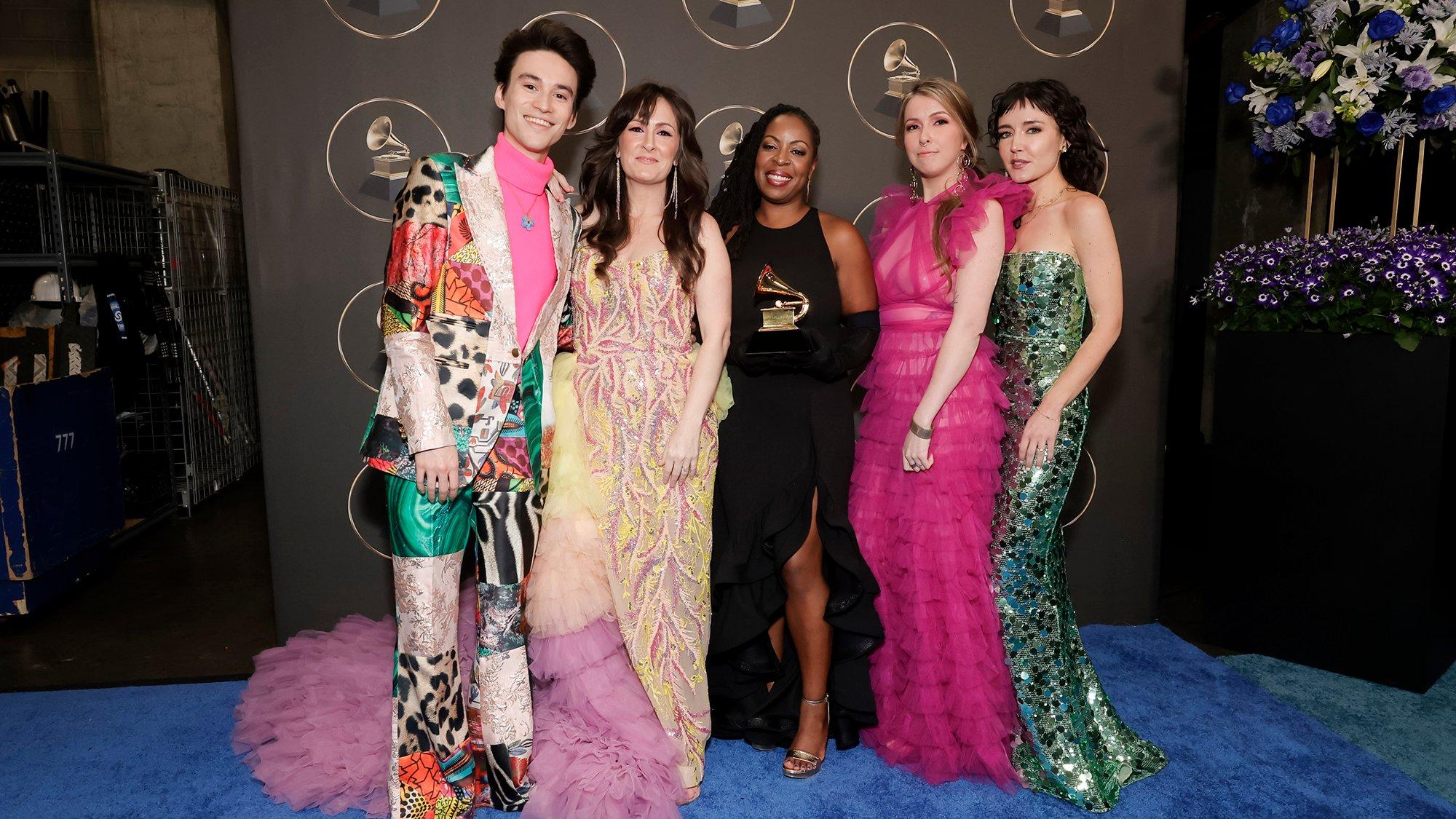Photo: Courtesy of The Latin Recording Academy/Carlos Alvarez, Getty Images © 2023

news
2023 Latin GRAMMYs: Natalia Lafourcade Wins Record Of The Year For "De Todas Las Flores"
Natalia Lafourcade won the Latin GRAMMY for Record Of The Year for "De Todas Las Flores" at the 2023 Latin GRAMMYs.
Natalia Lafourcade won the Latin GRAMMY for Record Of The Year for "De Todas Las Flores" at the 2023 Latin GRAMMYs.
Christina Aguilera's "No Es Que Te Extrañe," Pablo Alborán's "Carretera y Manta," Paula Arenas feat. Jesús Navarro's "Déjame Llorarte," Bizarrap feat. Shakira's "Shakira: Bzrp Music Sessions, Vol. 53," Fonseca & Juan Luis Guerra's "Si Tú Me Quieres," Karol G's "Mientras Me Curo Del Cora," Lasso's "Ojos Marrones," Maluma & Marc Anthony's "La Fórmula," Rosalía's "Despechá," and Alejandro Sanz feat. Danny Ocean's "Correcaminos" were the other nominees in the category.
Across her past few releases, Lafourcade paid tribute to the myriad musical traditions of Mexico — and Latin America writ large.
However, she made a heel turn in 2022 with De Todas Las Flores, an collection of original music.
On De Todas Las Flores’s hypnotic title track, Lafourcade further proves she’s one of Mexico's most thrilling and boundary-pushing alternative acts. Therein, Lafourcade seamlessly melds folkloric Latin music and jazz — and via her voice and guitar, weaves the tale of a very missed, bygone romance.
Check out the complete list of winners and nominees at the 2023 Latin GRAMMYs.

Photo: Lester Cohen/Getty Images for The Recording Academy
news
How The Latin GRAMMYs Brought Latin Music Excellence To The 2024 GRAMMYs
Latin music was celebrated throughout GRAMMY Week and on Music's Biggest Night. Read on for the many ways Latin music excellence was showcased at the 204 GRAMMYs.
The 2023 Latin GRAMMYs may have occurred months ago and thousands of miles away, but the leading lights in Latin music also shined at the 66th GRAMMY Awards. From historic wins and meaningful nominations, to electric performances and interesting installations, Latin music excellence was everywhere.
In anticipation of the 25th anniversary of the Latin GRAMMYs in 2024, the exclusive GRAMMY House — the site of multiple GRAMMY Week events — included a significant installation dedicated to the Biggest Night In Latin Music.
The cylindrical display showcased some of the biggest moments in Latin GRAMMY history, including images, facts, and even a real Latin GRAMMY award.
The celebration of Latin music continued throughout GRAMMY Week, with several Latin GRAMMY-winning artists also winning on the GRAMMY stage. Among the major moments at the 2024 GRAMMYs, Karol G won her first golden gramophone for her 2023 LP Mañana Será Bonito. "This is my first time at GRAMMYs, and this is my first time holding my own GRAMMY," the Colombian songstress exclaimed during her acceptance speech.
Música Mexicana star Peso Pluma also took home his first GRAMMY; his album GÉNESIS won in the Best Música Mexicana Album (Including Tejano) Category.
Premiere Ceremony presenter Natalia Lafourcade — whose Todas Las Flores won big at the 2023 Latin GRAMMYs — also took home the GRAMMY Award for Best Latin Rock or Alternative Album. She tied in the Category with Juanes.
Premiere Ceremony performer Gabby Moreno also took home a GRAMMY Award for Best Latin Pop Album for her album X Mí (Vol. 1).
Beyond the stage, Latin artists graced the red carpet and the nominations list. For example, producer and songwriter Edgar Barrera was the only Latino nominated in the Songwriter Of The Year, Non-Classical Category.

Photo: Emma McIntyre/Getty Images for The Recording Academy
news
Overheard Backstage At The 2024 GRAMMYs: What Jack Antonoff, Laufey & Other GRAMMY Winners Said
Get an exclusive glimpse inside the 66th GRAMMY Awards press room, where Jacob Collier, Natalia Lafourcade, Brandy Clark and others spoke with GRAMMY U about their big wins on Music's Biggest Night.
From Miley Cyrus winning her first GRAMMY to Billy Joel’s comeback performance after 30 years, the 2024 GRAMMYs were filled with a range of special moments at Crypto.com Arena.
Backstage at the Recording Academy’s media center and press room, GRAMMY U spoke with several GRAMMY winners just as they stepped off the stage. Each spoke about the vital role of collaboration in the studio, and the role they played in their GRAMMY-winning Categories.
Read on for insights from Jack Antonoff (Album Of The Year and Producer Of The Year, Non-Classical), Laufey (Best Traditional Pop Vocal Album), Jacob Collier (Best Arrangement, Instruments and Vocals), Natalia Lafourcade (Best Latin Rock or Alternative Album ), and Brandy Clark (Best Americana Performance).
Jack Antonoff Can Truly Fly Free With A Collaborator
The 10-time GRAMMY winner took home several golden gramophones on Feb. 4, including the prestigious Album Of The Year for Taylor Swift’s Midnights as well as Producer Of The Year, Non-Classical for the third consecutive year.
Antonoff told GRAMMY.com that, as a producer, collaboration is simply "everything."
"The visual I have is a balloon. When it's your words, lyrics, and your life, you have to be able to fly free without being scared of drifting away," Antonoff continues. "I see the producer holding that string, and I know both ends."
When he’s not creating hits for other artists, Antonoff delves into his own artistry as the founder and lead singer of indie rock band Bleachers, known for their hit single "I Wanna Get Better."
"When I’m making the Bleachers records, I’ll have these crazy thoughts and then [producer] Patrik Berger will ground me in it. I think it’s really about trust," Antonoff reflects.
Laufey Won In The Same Category As Many Idols
Laufey first wowed audiences with a live performance of her hit song "From the Start" at the 66th GRAMMY Awards Premiere Ceremony. Later in the day, the 24-year-old won her first GRAMMY on Sunday in the Category of Traditional Pop Vocal Album for Bewitched.
"This category means so much to me, so many of my inspirations and idols have won in this category before," she tells GRAMMY.com.
Read more: With 'Bewitched,' Icelandic Singer Laufey Is Leaving Jazz Neophytes Spellbound
Laufey transcends the boundaries of genre, blending jazz and pop into her original music. With 18 million likes on TikTok and 3 million monthly listeners on Spotify, the Icelandic singer/songwriter effused awe an gratitude.
"It feels so cool to make the kind of music I make today and still get recognized for it," she shares.
Jacob Collier Shared His Imnprovisiation Techniques
Collier won his sixth GRAMMY Award this year, taking home the golden gramophone for Best Arrangement, Instruments and Vocals for his feature on "In the Wee Small Hours of the Morning" by vocal supergroup Säje. The first-time GRAMMY-winning vocal group is composed of Sara Gazarek, Amanda Taylor, Johnaye Kendrick, and Erin Bentlage.
The multi-instrumentalist provided insight into the making of "In the Wee Hours of the Morning," revealing that this collaboration began with an improvisation Collier created around the song, which was later decorated with Säje’s harmonies.
"The best types of collaborations reveal parts of oneself that you wouldn’t otherwise have access to, and I think the amazing thing about [Säje] is that the four [of them] brought colors out of me that were new," Collier says.
"I feel so lucky to have been clothed by these four voices, it feels really wonderful," he says.
Natalia Lafourcade Realized Her Own Importance
Known for infusing a variety of Latin genres with elements of folk, jazz, and alternative music, Natalia Lafourcade picked up her fourth GRAMMY win for Best Latin Rock or Alternative Album with De Todas Las Flores.
"It took seven years for me to realize I need to write my own music again," Lafourcade says. "This album has [helped me realize] the importance of my inner garden, my creative universe."
The Mexican singer/songwriter also served as a presenter at the Premiere Ceremony, presenting in Categories such as Best Music Video and Best Song Written for Visual Media. Previously, Lafourcade won for Best Latin Rock or Alternative Album at the 58th GRAMMY Awards for Hasta La Raíz, and discussed the importance of reclaiming her sound in this category.
"Having the producers, musicians, and my beautiful team has been an incredible experience. It means a lot," she says.
Brandy Clark Loved Working With Brandi Carlile
After 17 nominations, Brandy Clark landed her first GRAMMY win in the category of Americana Performance. At the Premiere Ceremony, Clark performed a solo acoustic rendition of "Dear Insecurity," which features 10-time GRAMMY winner Brandi Carlile.
Previous nominations for the Washington native include Best Country Song and Best Country Solo Performance.
"The work I did with Brandi Carlile was really important for me. Seventeen nominations, first GRAMMY win — I’m mind blown," Clark says.
Clark's collaboration with Carlile is a key part of her support system, and she continues to push the boundaries of artistic expression — especially when it comes to her love for country music.

Photo: Patricia J. Garcinuno / WireImage / Getty Images
feature
Mañana Y Siempre: How Karol G Has Made The World Mas Bonito
'Mañana Será Bonito' may have been the vehicle for Karol G's massive year, but the 2024 GRAMMY nominee for Best Música Urbana Album has been making strides in reggaeton, urbano and the music industry at large for a long time.
For Karol G, 2023 was a watershed year. Her fourth album, Mañana Será Bonito, peaked at No. 1 on the Billboard Hot 200 and took home the golden gramophone for Album Of The Year at the Latin GRAMMYs. Her many milestones also included a Rolling Stone cover, and signing with Interscope. At the 2024 GRAMMYs, Mañana Será Bonito is nominated for Best Música Urbana Album.
The Colombian singer and songwriter was suddenly everywhere in 2023, but this moment is the culmination of a long, steady rise. Karol G has been on the scene for some time, and changing it for the better just by being who she is: an extremely talented woman making waves in a genre still dominated by men.
Karol G has been a pivotal figure in the world of urbano since 2017, when she collaborated with Bad Bunny on the Latin trap single "Ahora Me Llama." It was a transformative moment for both artists, whose careers took off precipitously after its release. The track led Ms. G’s aptly titled debut album, Unstoppable, which went multi-platinum and peaked at No. 2 on both the U.S. Top Latin Albums and U.S. Latin Rhythm Albums charts. At the 2018 Latin GRAMMYs, Karol was awarded Best New Artist.
2024 GRAMMYs: Explore More & Meet The Nominees
2024 GRAMMYs: See The Full Winners & Nominees List
How To Watch The 2024 GRAMMYs Live: GRAMMY Nominations, Performers, Air Date, Red Carpet, Streaming Channel & More
2024 GRAMMYs Performers: Burna Boy, Luke Combs And Travis Scott Announced
2024 GRAMMYs Performers: Billie Eilish, Dua Lipa, And Olivia Rodrigo Announced
Get The Full 2024 GRAMMYs Experience On Live.GRAMMY.com: Performances, Interviews, Red Carpet, Backstage & More
Here Are The Album Of The Year Nominees At The 2024 GRAMMYs
Here Are The Song Of The Year Nominees At The 2024 GRAMMYs
Get To Know The Best New Artist Nominees At The 2024 GRAMMYs
Here Are The Record Of The Year Nominees At The 2024 GRAMMYs
Although she came out of the gate in an unstoppable fashion, Karol G's chart-topping debut was the result of years of touring and recording. The artist born Carolina Giraldo Navarro was no overnight success.
She started singing as a teenager growing up in Medellín and, after signing to Colombia's Flamingo Records, chose the name Karol G and began releasing music. Early on, she flew to Miami for a meeting with Universal Records, but they chose not to sign her on the basis that a woman would not be successful making reggaeton — a severe miscalculation, that belies female pioneers and a blossoming roster of contemporary acts.
Thankfully, she ignored them. A year after "Ahora Me Llama" and Unstoppable, Karol G won her first Latin GRAMMY.
The star’s determination makes her a role model, but Karol G's career has also been defined by an inspiring integrity around her principles and artistic vision. By now, it is a well-known anecdote that she turned down the song "Sin Pijama" because it references marijuana use. Karol does not smoke, so the lyrics would not have been authentic to her as a person, or as an artist.
This authenticity has doubtless been key to Karol G's success. Rather than try to fit an established mold, she brings a uniquely sunny swagger and sporty style to reggaeton. She projects a powerful and feminine energy, and her music often expresses a healthy sense of sexual independence and self-empowerment. This is an intentional part of her message, especially to her female fans.
"They teach us it’s wrong to celebrate ourselves for something we have," she told Rolling Stone of her musical messaging. "And it’s not. We have to be the first ones to give ourselves credit."
Like early collaborator Bad Bunny, Karol G is able to reach a global audience without having to change the language she sings in, her genre of choice, or her messages. Case in point: One of her 2023 accomplishments was becoming the first Latina to headline a global stadium tour, and the highest-grossing Latin touring artist of the year.
She also became the first Latina to headline Lollapalooza and, in between record-breaking tour dates, saw her song "WATATI" featured on Barbie The Album. (The soundtrack is nominated for Best Compilation Soundtrack For Visual Media at the 66th GRAMMY Awards.)
In November, she closed out her big year with a sweep of the Latin GRAMMYs: Mañana Será Bonito received the award for Best Música Urbana Album and Album Of The Year; her Shakira collab "TQG" took home the golden gramophone for Best Urban Fusion/Performance. When she accepted her award for Best Música Urbana Album, Karol exclaimed, "How cool is it for a woman to win this?"
Karol G’s wins made up a large part of an awards ceremony where women won big: Shakira won Song Of The Year for her collaboration with Bizzarap, while Natalia Lafourcade won Record Of The Year and Joaquina took home Best New Artist. This was the first year that women won in all the general categories — something that suggests progress for the Latin music industry. The last time a woman won the Latin GRAMMY for Best Música Urbana Album was in 2013, when Spanish rapper Mala Rodríguez took home the award for Bruja.
Watching the Latin GRAMMYs this year, it was easy to forget that women still have a long way to go to achieve parity with their male counterparts in the music industry. If you lost sight of that, the year-end Latin charts would bring you back to reality: Of the top 50 tracks on the Hot Latin Songs chart, 11 primarily featured women, but six of those tracks belonged to Karol G. Karol’s presence matters and she knows it.
Karol G brings a powerful feminine energy to reggaeton and Latin trap, but also an unapologetic feminism. While this is explicit in her music, it's also clear in the creative partnerships she makes. She’s had many high profile collaborations with male artists, but just as many with a diverse roster of female artists from reggaeton OG Ivy Queen ("Leyendas") to Latin fusion pop singer Kali Uchis ("Me Tengo Que Ir," "Labios Mordidos"). In an arena so dominated by male artists, each collaboration with another woman is meaningful, but her collaborations with rising artists, such as Young Miko — who appears on the song "Dispo" from Karol’s Bichota Season — truly make a difference.
Artists like Karol G increase the range of possibilities for artists in their wake, and for anyone in the music industry who flouts narrow expectations. Karol G knows that her victories have larger implications, and this eye toward the future has helped her reach unprecedented heights. "I understand how hard it is [for women to break through] because of how hard it was for me,"she recently told Billboard.
It wasn't easy for Karol G to get where she is today, but she has been opening doors for others — women, artists in reggaeton, artists in urbano and others — every step of the way. From here on, the title of her album is ringing more and more prescient, and that’s mas bonito.

Photo: Mariano Regidor / Redferns / Getty Images
interview
Catching Up With Natalia Lafourcade: How Togetherness, Improvisation & The Element Of Surprise Led To Her Most Exquisite Album
"I feel completely overtaken by this record," Natalia Lafourcade says of 'De Todas las Flores.' Her first album of original material in several years is nominated in the Best Latin Rock or Alternative Album Category at the 2024 GRAMMYs.
Even those who were familiar with the artistry of Mexican singer/songwriter Natalia Lafourcade were stunned by De Todas las Flores, her tenth studio album. Her first collection of original material in seven years, it is also her most vulnerable and sophisticated work to date. Her voice has such an immediacy that almost leaps off the speakers.
Lafourcade is only 39, but she sounds like an old soul on these delicately arranged songs informed by Latin formats like bossa nova, bolero and trova. The shades of composer Claude Debussy in the intro of the folk ballad "Llévame Viento" are no coincidence — her album is a neo-impressionist masterpiece, the best effort of her career, and a fitting nominee in the Best Latin Rock or Alternative Album Category at the 2024 GRAMMYs.
"I would never have imagined my album being nominated in this category. But then I think about the idiosyncrasies of rock — a style spawned from broken places, the crevice where a flower can blossom — and it makes sense," Lafourade told GRAMMY.com in a roundtable discussion with her fellow 2024 nominees.
Recorded live to tape without any previous rehearsals together with a select group of virtuoso, jazz-oriented musicians — including Marc Ribot on guitar — the collection has an austere beauty to it, favoring a purity of sound and stately elegance that has been mostly absent from Latin music during the past decade. No visitors were allowed during the 12 days of sessions to preserve the intimacy of the process.
Helmed by acclaimed producer Adan Jodorowsky, De Todas las Flores was mixed in Paris — a trip that allowed the singer the opportunity to visit the legendary flower garden by painter Claude Monet. "This album saved me," Lafourcade says. "It reminded me to be responsible for my own garden, my self-care. Its message is not only directed at me, but to other people as well."
Lafourcade’s commitment to her art and her fastidious attention to detail were rewarded at the 2023 Latin GRAMMYs. On the Sevilla stage, she won golden gramophones Record Of The Year, Best Singer/Songwriter Album and Best Singer/Songwriter Song Categories.
Ahead of the 66th GRAMMY Awards, the singer discussed her recent tour, her recording process, and the album’s common points with a Cuban classic from decades past.
One of the best things that happened to me last year was seeing you in concert during your U.S. tour. I was especially impressed by the gigantic costume that you begin the show with — the larger-than-life skirt.
Ah, yes, the skirt. [Laughs.] It all began at the photo shoot for the new album. The photographer asked me to wear a huge skirt because she liked the texture, like taffeta. I loved the end result and asked my stage designers for a skirt of many meters in diameter. Something truly huge that would allow me to transform myself. It could be like a boulder, or the endless sea, or a shadow that I carried along with me.
I wanted something absurdly elegant, the kind of ritualistic getup that you may wear at a wedding or a lavish evening reception. I was getting ready to present the album at Carnegie Hall, and I imagined myself walking onstage in the darkness — the skirt would be the protagonist.
You leave the big skirt behind after the first half of the show. I imagined there was a deeper meaning to that.
The skirt represents the darkness and emptiness that you feel when there your soul breaks down. It’s like a dark canvass that allows you the option of painting it with light, thus finding life again. The skirt pins me down during the first half of the show, but then I lose it, much like an animal sheds its skin.
All that death — the shadows, the tears, the emptiness — I offer it to the light as a gift, with the understanding that darkness can also be the greatest teacher. The moment where I took off the skirt became very moving to me, like psychomagic. Getting rid of that unwanted weight — but at the same honoring it with gratitude.
2024 GRAMMYs: Explore More & Meet The Nominees
2024 GRAMMYs: See The Full Winners & Nominees List
How To Watch The 2024 GRAMMYs Live: GRAMMY Nominations, Performers, Air Date, Red Carpet, Streaming Channel & More
2024 GRAMMYs Performers: Burna Boy, Luke Combs And Travis Scott Announced
2024 GRAMMYs Performers: Billie Eilish, Dua Lipa, And Olivia Rodrigo Announced
Get The Full 2024 GRAMMYs Experience On Live.GRAMMY.com: Performances, Interviews, Red Carpet, Backstage & More
Here Are The Album Of The Year Nominees At The 2024 GRAMMYs
Here Are The Song Of The Year Nominees At The 2024 GRAMMYs
Get To Know The Best New Artist Nominees At The 2024 GRAMMYs
Here Are The Record Of The Year Nominees At The 2024 GRAMMYs
Just like the skirt, De Todas las Flores is a larger-than-life record. I believe it will be treasured by fans for many decades. In a way, it’s the kind of album that transcends us all. Do you feel the same?
I feel completely overtaken by this record. It’s the kind of rare album that appears once in a while. It forced me to become exceedingly humble, honest and patient with myself. My task was to deliver these songs, and let them do their thing with the people who listen and absorb them.
I am grateful that it is recognized and nominated, but it goes beyond any marketing strategy or accounting.
Something that strikes me about the album is the almost supernatural immediacy of your voice. It sounds like you’re right here singing those tunes. How is that effect achieved?
I think you’re referring to the magic of an energy that I could not really explain with words. It’s like a physical sensation about something that arrives from a different place. It’s not in me — it’s just passing through my being.
I’ve never considered myself a virtuoso singer. When we were making the album, I tried to remove myself from the equation. I was vocalizing with the least possible effort, simply surrendering to the songs, allowing them to express what they wanted to say. It felt warm and comforting.
What about the actual recording process?
There were different elements that played a part in creating that feeling: the fact that we were playing together in the same room, without a click track, reverb or autotune of any kind.
The element of surprise played a big part, because we didn’t really know where the music was taking us. We relied largely on improvisation. We felt it was important to respect the natural qualities of my voice, the instruments, even the echo in the room. I knew that it would add a special quality to the album, and make it sound like you describe it.
I remember the indelible moment of listening to Casa for the first time in 2005. A young girl singing bossa novas about ducklings and sunny love songs about baking a cake for her beau...
So innocent, right? [Laughs.]
The vibe of that record was incredibly light and frothy. In contrast, De Todas las Flores has this beautiful, ever-present gravity. How did you become the singer you are today?
My music has always involved a transference of my soul and personality in the present moment. In the period of time that elapsed between both albums, at one point I broke down. It happens to all of us. The dance of life gives us moments of flight, and moments of crashing down — I see both as treasures.
My life has been marked by changes. The register of my voice is different; I can’t sing a number of melodies the way I used to. The road taken has given me experience, and you find different shades as you go through life. I’ve learned not to run away from the dark moments, but rather take from them something that can enrich my art.
That said, a song like "Canta la Arena" [from De Todas las Flores] is related to the bossa novas of my youth. It’s about finding life and joy at a beach in Veracruz. There are elements that pull me out of the shadows, and I interpret them through my current point of view. The only way to reinvent yourself is to live intensely, to search and explore. De Todas las Flores is about doing that. A song like "“Pajarito Colibrí" is about liberating your soul from a place of mourning.
I may be completely off, but the acoustic vibe and wide-open spaces remind me of the first Buena Vista Social Club album...
What a spectacular reference. We definitely had in mind albums like Buena Vista, Kind of Blue, Coltrane’s A Love Supreme, and some Nina Simone records. They all reflect the same search – our album is Latin in the point of view, but reflected through the prism of jazz. A group of musicians playing together in the same room, with audible mistakes. We played together, reading each other, finding the rhythm of the moment in an organic way. Just like the Buena Vista Social Club did.
That album happened by mistake, of course. It was meant as a conclave of African musicians playing in Cuba, but when they didn’t show up, Ry Cooder assembled an improvised group of local veterans.
At one point in the recording, Marc Ribot commented that real music happens within a short span of time. It’s a very intense moment of togetherness, and somebody must be there and press the record button.
So many coincidences need to happen at the same time for the magic to take place. I’m always praying for that moment, because when it happens, I feel truly alive.
